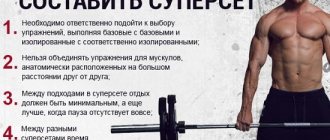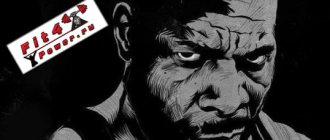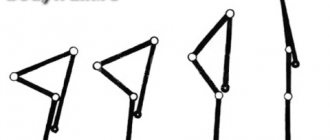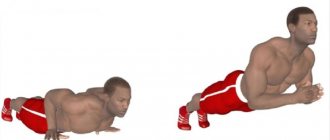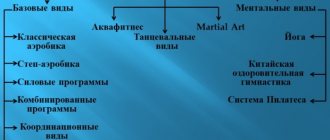Auxiliary exercises for standing barbell press
Exercises of the 1st link
- Partial (to dead center) explosive chest press: 50-60% of max*3-5 reps*3-5 sets.
- Standing press with limiters from the height of the dead center: X-weight * 3-5 reps * 3-5 approaches.
- Bench press on an incline/horizontal bench with a medium grip: X-weight*5-8 reps*3-5 sets.
- Seated dumbbell/barbell presses, standing dumbbell presses: X-weight*6-10 reps*3-5 approaches.
- Dips with additional weights: X-weight * 5-8 reps * 3-5 approaches.
- Push/Push Press: X-weight*3-8 reps*3-5 sets.
- Pull/snatch style: X-weight*10-15 reps*3-5 sets.
Exercises of the 2nd link
- Any exercises for triceps, deltoids, pectoral muscles, back muscles (work on extensors is required) and trapezius in X-weight mode * 8-15 repetitions * 3-5 approaches. Here are exercises for the abdominal muscles X-weight * 6-30 repetitions * 3-5 approaches.
Exercises of the 3rd link
- Any exercises for the muscles of the legs/biceps/forearms in X-weight mode * 8-15 repetitions * 3-5 approaches.
An excerpt characterizing world records in weightlifting
The old prince was in good spirits and treated Pierre kindly. Before dinner, Prince Andrei, returning back to his father’s office, found the old prince in a heated argument with Pierre. Pierre argued that the time would come when there would be no more war. The old prince, teasing but not angry, challenged him. - Let the blood out of your veins, pour some water, then there will be no war. “A woman’s nonsense, a woman’s nonsense,” he said, but still affectionately patted Pierre on the shoulder and walked up to the table where Prince Andrei, apparently not wanting to engage in conversation, was sorting through the papers the prince had brought from the city. The old prince approached him and began to talk about business. - The leader, Count Rostov, did not deliver half of the people. I came to the city, decided to invite him to dinner, - I gave him such a dinner... But look at this... Well, brother, - Prince Nikolai Andreich turned to his son, clapping Pierre on the shoulder, - well done, your friend, I loved him! Fires me up. The other one speaks smart things, but I don’t want to listen, but he lies and inflames me, an old man. Well, go, go,” he said, “maybe I’ll come and sit at your dinner.” I'll argue again. “Love my fool, Princess Marya,” he shouted to Pierre from the door. Pierre only now, on his visit to Bald Mountains, appreciated all the strength and charm of his friendship with Prince Andrei. This charm was expressed not so much in his relationships with himself, but in his relationships with all his relatives and friends. Pierre, with the old, stern prince and with the meek and timid Princess Marya, despite the fact that he hardly knew them, immediately felt like an old friend. They all already loved him. Not only Princess Marya, bribed by his meek attitude towards the strangers, looked at him with the most radiant gaze; but little, one-year-old Prince Nikolai, as his grandfather called him, smiled at Pierre and went into his arms. Mikhail Ivanovich, m lle Bourienne looked at him with joyful smiles as he talked with the old prince. The old prince went out to dinner: this was obvious to Pierre. He was extremely kind to him both days of his stay in Bald Mountains, and told him to come to him. When Pierre left and all the family members came together, they began to judge him, as always happens after the departure of a new person, and, as rarely happens, everyone said one good thing about him. Returning this time from vacation, Rostov felt and learned for the first time how strong his connection was with Denisov and with the entire regiment. When Rostov drove up to the regiment, he experienced a feeling similar to the one he experienced when approaching the Cook's House. When he saw the first hussar in the unbuttoned uniform of his regiment, when he recognized the red-haired Dementyev, he saw the hitching posts of red horses, when Lavrushka joyfully shouted to his master: “The Count has arrived!” and shaggy Denisov, who was sleeping on the bed, ran out of the dugout, hugged him, and the officers came to the newcomer - Rostov experienced the same feeling as when his mother, father and sisters hugged him, and the tears of joy that came to his throat prevented him from speaking . The regiment was also a home, and the home was invariably sweet and dear, just like the parental home. Having appeared before the regimental commander, having been assigned to the previous squadron, having gone on duty and foraging, having entered into all the small interests of the regiment and feeling himself deprived of freedom and shackled into one narrow, unchanging frame, Rostov experienced the same calm, the same support and the same consciousness the fact that he was at home here, in his place, which he felt under his parents’ roof. There was not all this chaos of the free world, in which he did not find a place for himself and made mistakes in the elections; there was no Sonya with whom it was or was not necessary to explain things. There was no option to go there or not to go there; there were no 24 hours of the day that could be used in so many different ways; there was not this countless multitude of people, of whom no one was closer, no one was further; there were no these unclear and uncertain financial relations with his father, there was no reminder of the terrible loss to Dolokhov! Here in the regiment everything was clear and simple. The whole world was divided into two uneven sections. One is our Pavlograd regiment, and the other is everything else. And there was nothing else to worry about. Everything was known in the regiment: who was the lieutenant, who was the captain, who was a good person, who was a bad person, and most importantly, a comrade. The shopkeeper believes in debt, the salary is a third; there is nothing to invent or choose, just don’t do anything that is considered bad in the Pavlograd regiment; but if they send you, do what is clear and distinct, defined and ordered: and everything will be fine. Having entered again into these certain conditions of regimental life, Rostov experienced joy and tranquility, similar to those that a tired person feels when he lies down to rest. This regimental life was all the more gratifying for Rostov during this campaign because, after losing to Dolokhov (an act for which he, despite all the consolations of his family, could not forgive himself), he decided to serve not as before, but in order to make amends, to serve well and to be a completely excellent comrade and officer, that is, a wonderful person, which seemed so difficult in the world, but so possible in the regiment. Rostov, from the time of his loss, decided that he would pay this debt to his parents in five years. He was sent 10 thousand a year, but now he decided to take only two, and give the rest to his parents to pay off the debt. Our army, after repeated retreats, offensives and battles at Pultusk, at Preussisch Eylau, concentrated near Bartenstein. They were awaiting the arrival of the sovereign to the army and the start of a new campaign. The Pavlograd regiment, which was in that part of the army that was on the campaign in 1805, was recruited in Russia, and was late for the first actions of the campaign. He was neither near Pultusk nor near Preussisch Eylau, and in the second half of the campaign, having joined the active army, he was assigned to Platov’s detachment. Platov's detachment acted independently of the army. Several times the Pavlograd residents were in units in skirmishes with the enemy, captured prisoners and once even recaptured the crews of Marshal Oudinot. In April, Pavlograd residents stood for several weeks near an empty German village that had been destroyed to the ground, without moving. There was frost, mud, cold, the rivers were broken, the roads became impassable; For several days they did not provide food to either the horses or the people. Since delivery became impossible, people scattered across abandoned desert villages to look for potatoes, but they found little of that. Everything was eaten, and all the inhabitants fled; those who remained were worse than beggars, and there was nothing to take from them, and even little - compassionate soldiers often, instead of taking advantage of them, gave them their last. The Pavlograd regiment lost only two wounded in action; but lost almost half of the people from hunger and disease. They died so surely in hospitals that soldiers, sick with fever and swelling resulting from bad food, preferred to serve, dragging their feet to the front rather than go to hospitals. With the opening of spring, the soldiers began to find a plant emerging from the ground, similar to asparagus, which they called for some reason Mashkin’s sweet root, and they scattered across the meadows and fields, looking for this Mashkin’s sweet root (which was very bitter), dug it up with sabers and ate it, despite to orders not to eat this harmful plant. In the spring, a new disease appeared among the soldiers, swelling of the arms, legs and face, the cause of which doctors believed was the use of this root. But despite the ban, the Pavlograd soldiers of Denisov’s squadron ate mainly Mashka’s sweet root, because for the second week they were stretching out the last crackers, they were only given half a pound per person, and the potatoes in the last parcel were delivered frozen and sprouted. The horses had also been eating thatched roofs from houses for the second week; they were hideously thin and covered with tufts of matted winter hair. Despite such a disaster, soldiers and officers lived exactly the same as always; in the same way now, although with pale and swollen faces and in tattered uniforms, the hussars lined up for calculations, went to the cleaning, cleaned horses, ammunition, dragged straw from the roofs instead of feed and went to dine at the boilers, from which the hungry got up, making fun of with your disgusting food and your hunger. Just as always, in their free time from service, the soldiers burned fires, steamed naked by the fires, smoked, selected and baked sprouted, rotten potatoes and told and listened to stories about either the Potemkin and Suvorov campaigns, or tales about Alyosha the scoundrel, and about the priest's farmhand Mikolka. The officers, as usual, lived in twos and threes in open, half-ruined houses. The elders took care of purchasing straw and potatoes, in general about the means of subsistence of the people, the younger ones were busy, as always, with cards (there was a lot of money, although there was no food), and with innocent games - pile and towns. Little was said about the general course of affairs, partly because they knew nothing positive, partly because they vaguely felt that the general cause of the war was going badly. Rostov lived, as before, with Denisov, and their friendly relationship, since their vacation, had become even closer. Denisov never spoke about Rostov’s family, but from the tender friendship that the commander showed to his officer, Rostov felt that the old hussar’s unhappy love for Natasha participated in this strengthening of friendship. Denisov apparently tried to expose Rostov to danger as little as possible, took care of him and after the case he especially joyfully greeted him safe and sound. On one of his business trips, Rostov found in an abandoned, devastated village, where he had come for provisions, the family of an old Pole and his daughter with an infant. They were naked, hungry, and could not leave, and did not have the means to leave. Rostov brought them to his camp, placed them in his apartment, and kept them for several weeks while the old man recovered. Rostov's comrade, having started talking about women, began to laugh at Rostov, saying that he was more cunning than everyone else, and that it would not be a sin for him to introduce his comrades to the pretty Polish woman he had saved. Rostov took the joke as an insult and, flushing, said such unpleasant things to the officer that Denisov could hardly keep both of them from the duel. When the officer left and Denisov, who himself did not know Rostov’s relationship with the Polish woman, began to reproach him for his temper, Rostov told him: “How do you want it... She’s like a sister to me, and I can’t describe to you how offended it was for me... because that... well, because... Denisov hit him on the shoulder and quickly began to walk around the room, without looking at Rostov, which he did in moments of emotional excitement. “What dug’ak weather you have, G’ostovskaya,” he said, and Rostov noticed tears in Denisov’s eyes. In the month of April, the troops were enlivened by the news of the arrival of the sovereign to the army. Rostov did not manage to get to the review that the sovereign was doing in Bartenstein: the Pavlograd residents stood at outposts, far ahead of Bartenstein. They stood in bivouacs. Denisov and Rostov lived in a dugout dug for them by the soldiers, covered with branches and turf. The dugout was constructed in the following way, which then became fashionable: a ditch was dug one and a half arshins wide, two arshins deep and three and a half long. At one end of the ditch there were steps, and this was a porch; the ditch itself was a room in which the happy ones, like the squadron commander, on the far side, opposite the steps, had a board lying on stakes - it was a table. On both sides along the ditch, a yard of earth was removed, and these were two beds and sofas. The roof was arranged so that you could stand in the middle, and you could even sit on the bed if you moved closer to the table. Denisov, who lived luxuriously because the soldiers of his squadron loved him, also had a board in the gable of the roof, and in this board there was broken but glued glass. When it was very cold, the heat from the soldiers’ fires was brought to the steps (to the reception room, as Denisov called this part of the booth) on a curved iron sheet, and it became so warm that the officers, of whom there were always many at Denisov and Rostov’s, sat alone shirts. In April, Rostov was on duty. At 8 o'clock in the morning, returning home after a sleepless night, he ordered the heat to be brought, changed his rain-wet clothes, prayed to God, drank tea, warmed up, put things in order in his corner and on the table, and with a weather-beaten, burning face, wearing only a shirt, he lay on his back with his hands under his head. He pleasantly thought that one of these days he should receive his next rank for the last reconnaissance, and expected Denisov to go somewhere. Rostov wanted to talk to him. Behind the hut, Denisov’s rolling cry was heard, obviously getting excited. Rostov moved to the window to see who he was dealing with and saw Sergeant Topcheenko. - I told you not to let them burn this cog, some kind of machine! - Denisov shouted. – After all, I saw it myself, Lazag’chuk was dragging him from the field. “I ordered, your honor, they didn’t listen,” answered the sergeant. Rostov lay down on his bed again and thought with pleasure: “Let him fuss and fuss now, I’ve finished my job and I’m lying down - great!” From behind the wall he heard that, in addition to the sergeant, Lavrushka, that lively rogue lackey of Denisov, was also speaking. Lavrushka told something about some carts, crackers and bulls, which he saw while going for provisions. Behind the booth, Denisov’s scream was heard again, retreating, and the words: “Saddle up! Second platoon! “Where are they going?” thought Rostov. Five minutes later, Denisov entered the booth, climbed onto the bed with dirty feet, angrily smoked a pipe, scattered all his things, put on a whip and a saber and began to leave the dugout. To Rostov’s question, where? he answered angrily and vaguely that there was a matter. - God and the great sovereign judge me there! - Denisov said, leaving; and Rostov heard the feet of several horses splashing in the mud behind the booth. Rostov didn’t even bother to find out where Denisov went. Having warmed himself up in his coal, he fell asleep and just left the booth in the evening. Denisov has not returned yet. The evening cleared up; Near the neighboring dugout, two officers and a cadet were playing pile, laughingly planting radishes in the loose, dirty soil. Rostov joined them. In the middle of the game, the officers saw carts approaching them: about 15 hussars on thin horses followed them. The carts, escorted by the hussars, drove up to the hitching posts, and a crowd of hussars surrounded them. “Well, Denisov kept grieving,” said Rostov, “and now the provisions have arrived.” - And then! - said the officers. - Those are very welcome soldiers! - Denisov rode a little behind the hussars, accompanied by two infantry officers with whom he was talking about something. Rostov went to meet him halfway. “I’m warning you, captain,” said one of the officers, thin, small in stature and apparently embittered. “After all, I said that I wouldn’t give it back,” Denisov answered. - You will answer, captain, this is a riot - take away the transports from your own! We didn't eat for two days. “But mine didn’t eat for two weeks,” answered Denisov. - This is robbery, answer me, my dear sir! – the infantry officer repeated, raising his voice. - Why are you pestering me? A? - Denisov shouted, suddenly getting excited, - I will answer, not you, and you don’t buzz around here while you’re still alive. March! – he shouted at the officers. - Good! – without timidity and without moving away, the little officer shouted, “to rob, so I’ll tell you... - March to Chog’t at a quick pace, while you’re safe.” – And Denisov turned his horse towards the officer. “Okay, okay,” the officer said with a threat, and, turning his horse, he rode away at a trot, shaking in the saddle. “A dog is dead, a living dog is dead,” Denisov said after him - the highest mockery of a cavalryman at a mounted infantryman, and, approaching Rostov, he burst out laughing. – He recaptured the infantry, recaptured the transport by force! - he said. - Well, shouldn’t people die of hunger? The carts that approached the hussars were assigned to an infantry regiment, but, having been informed through Lavrushka that this transport was coming alone, Denisov and the hussars repulsed it by force. The soldiers were given plenty of crackers, even shared with other squadrons. The next day, the regimental commander called Denisov to him and told him, covering his eyes with open fingers: “I look at it like this, I don’t know anything and I won’t start anything; but I advise you to go to headquarters and there, in the provisions department, settle this matter, and, if possible, sign that you received so much food; otherwise, the demand is written down on the infantry regiment: the matter will arise and may end badly.” Denisov went directly from the regimental commander to headquarters, with a sincere desire to carry out his advice. In the evening he returned to his dugout in a position in which Rostov had never seen his friend before. Denisov could not speak and was choking. When Rostov asked him what was wrong with him, he only uttered incomprehensible curses and threats in a hoarse and weak voice... Frightened by Denisov’s situation, Rostov asked him to undress, drink water and sent for a doctor. - I should be judged for crime - oh! Give me more water - let them judge, but I will, I will always beat the scoundrels, and I will tell the sovereign. Give me some ice,” he said. The regimental doctor who came said that it was necessary to bleed. A deep plate of black blood came out of Denisov’s shaggy hand, and only then was he able to tell everything that happened to him. “I’m coming,” Denisov said. - “Well, where is your boss here?” Shown. Would you like to wait? “I have work, I came 30 miles away, I don’t have time to wait, report.” Okay, this chief thief comes out: he also decided to teach me: This is robbery! - “Robbery, I say, is committed not by the one who takes provisions to feed his soldiers, but by the one who takes it to put it in his pocket!” So would you like to remain silent? "Fine". Sign, he says, with the commission agent, and your case will be handed over to the command. I come to the commission agent. I enter - at the table... Who?! No, just think!...Who is starving us, - Denisov shouted, hitting the table with the fist of his sore hand, so hard that the table almost fell and the glasses jumped on it, - Telyanin! “What, are you starving us?!” Once, once in the face, deftly it was necessary... “Ah... with this and that and... began to roll. But I was amused, I can say,” Denisov shouted, baring his white teeth joyfully and angrily from under his black mustache. “I would have killed him if they hadn’t taken him away.” “Why are you shouting, calm down,” Rostov said: “here the blood is starting again.” Wait, I need to bandage it. Denisov was bandaged and put to bed. The next day he woke up cheerful and calm. But at noon, the regiment's adjutant, with a serious and sad face, came to the common dugout of Denisov and Rostov and with regret showed a uniform paper to Major Denisov from the regimental commander, in which inquiries were made about yesterday's incident. The adjutant reported that the matter was about to take a very bad turn, that a military court commission had been appointed and that with the real severity regarding the looting and willfulness of the troops, in a happy case, the matter could end in demotion. The case was presented by those offended in such a way that, after the transport was recaptured, Major Denisov, without any summons, came to the chief of provisions in a drunken state, called him a thief, threatened him with beatings, and when he was taken out, he rushed into the office and beat up two officials and sprained one's arm. Denisov, in response to Rostov’s new questions, laughingly said that it seemed like someone else had turned up here, but that it was all nonsense, nonsense, that he didn’t even think of being afraid of any courts, and that if these scoundrels dare to bully him, he would answer them so that they will remember. Denisov spoke disparagingly about this whole matter; but Rostov knew him too well not to notice that in his soul (hiding it from others) he was afraid of the trial and was tormented by this matter, which, obviously, was supposed to have bad consequences. Every day, requests for papers and demands to the court began to arrive, and on the first of May Denisov was ordered to surrender the squadron to his senior man and appear at the division headquarters for explanations in the case of rioting in the provisions commission. On the eve of this day, Platov made reconnaissance of the enemy with two Cossack regiments and two squadrons of hussars. Denisov, as always, rode ahead of the line, flaunting his courage. One of the bullets fired by the French riflemen hit him in the flesh of his upper leg. Maybe at another time Denisov would not have left the regiment with such a light wound, but now he took advantage of this opportunity, refused to report to the division and went to the hospital.
It’s possible to tear off almost three tons of weight!
He set one of the most incredible world records in lifting weights from racks. Anderson was able to lift 2844 kg of weight, which exceeded the records set before him by almost a ton.
Andy Bolton, an English weightlifter, also set incredible world records in weightlifting. He set three world records: squat with a weight of 550.5 kg, deadlift - 457.5 kg, total triathlon - 1273 kg. Andy became the first man on the planet to deadlift more than 453.6 kg (1,000 lbs).
In the deadlift, we should note the successes of Benedikt Magnusson. In the spring of 2011, wearing the equipment, he set a world record in weightlifting and lifted a weight of 460 kg at the Ronnie Coleman classic tournament.
As for the bench press, one cannot fail to mention the achievement of the American athlete Ryan Kennelly. Without equipment, he bench presses 297 kg. A lot of? In equipment in 2008, Ryan bench pressed 478.6 kg! So far, no one can break this world record in weightlifting.
What's next?
Many experts say that new world records in weightlifting, which are set by athletes, are less and less different from those already set. And this is even despite new methods, nutrition and funding for athletes. More and more people associate this with the fact that they have simply already come close to the capabilities of the physical strength of the human body, and therefore there can no longer be large gaps in the records. Whether this is true or not, only time will help figure it out. As they say, “we’ll wait and see.”
Iran ahead
In an exercise such as the snatch, in the open weight category, world weightlifting records belong only to athletes from Iran. And it is noteworthy that the last two belong to a teacher and his student. So, in 2003, Hossein Reza Zadeh set a world record by making a snatch with a barbell weight of 213 kg. And in 2011, his student Bedhad Salimi surpassed his teacher and managed to make a snatch at the National Tournament, which was held in Iran, with a weight of 214 kg. At the same time, Hossein’s world weightlifting record in the clean and jerk remained unbroken - no one managed to lift a weight greater than 263 kg.
Despite the development of training systems, as well as sports supplements used by weightlifters, so far no one has been able to surpass the result of the Soviet athlete Leonid Taranenko, who in 1988 achieved a weight in the clean and jerk of 266 kg. Then in the double event he gained 475 kg.
Also unsurpassed is the result of the Turkish athlete N. Suleymanoglu, who in the same 1988 was able to push a barbell weighing 190 kilograms, thereby setting a new world record in weightlifting. Doesn't seem like much? Your opinion will change when you find out in what category the athlete performed at that time - up to 60 kg. That is, the Turk was able to lift a weight that was more than three times his own!
Weights are lighter than feathers to them
Let's touch on kettlebell lifting a little. World champion in this sport Pavel Lesnykh, who lives in the Altai Territory, never tires of setting new records. In 2007, Pavel set a world record by pushing a 36 kilogram weight 1030 times. He completed it in exactly an hour and a half.
And this is truly a monumental achievement, since the previous record, which was set by Vyacheslav Khoronenko, the “Belarusian King of Kettlebells,” was 1020 jerks with a weight of 32 kilograms.
In addition, Pavel managed to push a weight weighing 41 kg 209 times, as well as hold a weight weighing 52 kg for 30 minutes, thereby setting new world weightlifting records.
Another Russian athlete, Ivan Denisov, a multiple champion of Russia and the world in kettlebell lifting, managed to set no fewer world records. He set a world record for the long cycle kettlebell clean and jerk. Pushing a 32-kilogram weight in 2007, he managed to achieve a result of 109 points. And in 2005, Ivan was able to score 387 points in the double event, which consists of the clean and jerk and snatch. At the same time, he scored 175 points in the clean and jerk, and 220 points in the snatch.
Muscles involved in the military press
Direct movers:
- anterior delta – throughout the entire range of motion;
- middle delta - the area from the dead center (middle of the forehead) to 3-4 cm above the crown;
- triceps – barbell push-up (after dead center);
- upper chest – breaking the bar, “accelerating” it to a dead point.
Assistant muscles:
- trapezius top - the final “insertion” of the shoulder joints at the top point;
- middle and bottom of the trapezoid - the bar breaks down until it passes the dead center;
- supraspinatus muscle – barbell failure.
Stabilizing muscles:
- abdominal muscles – provide a stable position of the body;
- back extensors – provide a stable position of the body;
- rear delta and upper back mass – stabilizes the shoulder joint;
- leg muscles - stabilize the stable position of the body.


